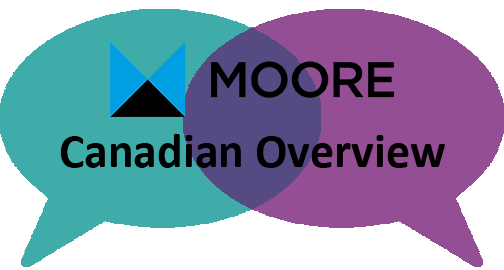 This article is from the quarterly Canadian Overview, a newsletter produced by the Canadian member firms of Moore North America. These articles are meant to pursue our mission of being the best partner in your success by keeping you aware of the latest business news.
This article is from the quarterly Canadian Overview, a newsletter produced by the Canadian member firms of Moore North America. These articles are meant to pursue our mission of being the best partner in your success by keeping you aware of the latest business news.
More than a year has passed since the U.S. Supreme Court rendered its decision in the case of
South Dakota v. Wayfair Inc. States can now require an out-of-state seller to register for their Sales and Use Tax (“SUT”) and collect it even if this seller doesn’t have a physical presence in the state. The creation of the Economic Nexus has been one of the most important changes in matters of sales tax in the U.S. these past few years.
Today, most states have adopted the Economic Nexus legislation. However, each has its own set of rules which differs from one state to the next.
States Which Have Adopted Economic Nexus Rules
As of August 1st, 2019, 43 out of the 45 states that impose a SUT had adopted the Economic Nexus, each having different effective dates and rules. Florida and Missouri are the only two states that haven’t followed suit.
Economic Nexus Threshold
South Dakota established that out-of-state sellers with more than $100 000 in sales or 200 transactions on their territory meet the Economic Nexus and are therefore required to register for SUT purposes. Most states adopted this threshold while others opted for a higher threshold (between $250 000 and $500 000).
Many states do not require a certain number of transactions. Other states, such as New York, requires that both criteria be met (sales and transactions). As for Kansas, the very first taxable sale generates the Economic Nexus.
Sales Included in the Threshold
Sales included in the threshold differ from one state to another. Most states use gross sales to establish if the Economic Nexus is met, while other states, like Illinois, only take into consideration retail sales. Pennsylvania, for its part, only considers taxable sales.
Impacts and Changes for Your Company
Canadian companies doing business in the United States of America without a physical presence should review and update their SUT analysis and register themselves in some states, if required.
Our team at Demers Beaulne can help you identify in which states your company meets the Economic Nexus and if it is required to register for SUT purposes.
Should you wish to learn more about the Economic Nexus rules, do not hesitate to contact our tax specialists.
Contributed by
Benoit Vallée, CPA, CGA, from
Demers Beaulne. This piece was produced as a part of the quarterly Canadian Overview, a newsletter produced by the Canadian member firms of Moore North America.